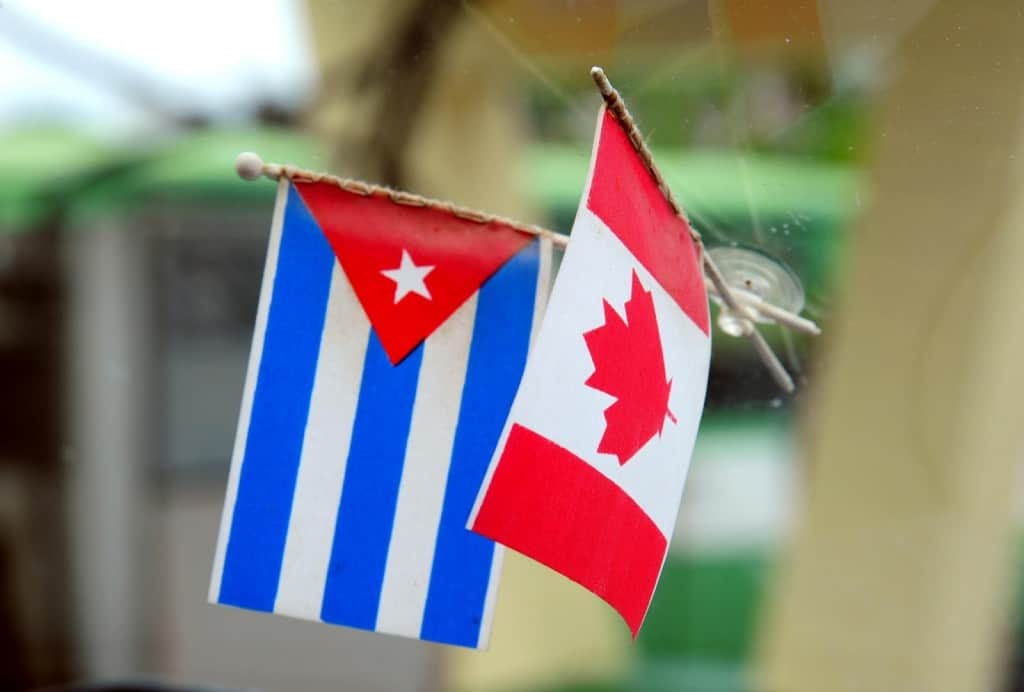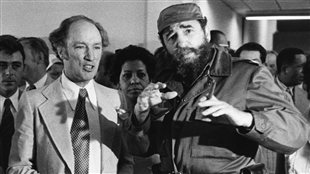
(Panamerican World)
In the spring of 2013, U.S. and Cuban negotiators needed a neutral location for secret talks that would lead — 18 months later— to the stunning, Dec. 17, 2014, announcement the world’s two “closest of enemies” were re-establishing relations. The only thing they could agree on initially, however, was that those talks should take place in friendly-with-both Canada.
Now, on the eve of U.S. President Barack Obama’s historic visit to Cuba, it’s worth asking what the fast evolving relationship between Washington and Havana — which we helped, in our modest way, to facilitate — will mean for the future of our own historic ties with Cuba.
After Fidel Castro’s revolution triumphed in 1959, Canada was one of the few western nations to maintain diplomatic relations with Cuba. In 1976, then-Prime Minister Pierre Trudeau became the first NATO leader to visit.

Trudeau with Castro, 1976 (Radio Canada)
For Canada, that visit became a symbolic moment in our quest for an elusive, independent “third-way” foreign policy, untethered to the United States or Great Britain. For Cuba, it was an important symbolic moment too — international recognition of its legitimate place in the world. “Viva Cuba!” Trudeau declared.
The visit had another far-reaching consequence too. Pierre and Fidel became such warm personal friends that, in 2000, the Cuban leader — by then ailing himself — flew to Montreal to serve as an honorary pallbearer at Trudeau’s state funeral.
Although relations iced over during the Harper era — his Conservative government opposed Cuba’s mere presence at events like the Summit of the Americas — the Cubans did not easily forget Canada had been its friend when others were not. In 2010, during Canada’s unsuccessful bid for a seat on the U.N. Security Council, Cuban diplomats even openly lobbied on our behalf with their Latin American counterparts.
Thanks to the 55-year-old American embargo, which has effectively prevented Americans from trading with — or traveling to — Cuba, and to the 1990s collapse of Cuba’s Soviet bloc benefactors, Canada has had unparalleled access to the Caribbean island nation.
Calgary’s Sherritt International — which boasts mining, oil-and-gas and electricity interests there — is now Cuba’s largest foreign investor. And the one-million sun-seeking Canadians who fly south every winter to enjoy the island’s spectacular beaches currently represent Cuba’s largest source of foreign tourists. Cuba even hosts the largest Terry Fox run for cancer research in the world, outside Canada.
With American businesses and individuals eager — and increasingly able — to share Cuba’s long forbidden fruit, Canada’s role in Cuba will inevitably diminish. But it’s worth reminding ourselves of that sweet 2010 moment at the United Nations when Cuba unexpectedly stood up for us. “You can trust Canada,” Cuba’s ambassador told his fellow diplomats.
Cubans do have long memories, and they won’t quickly forget who their friends have been.
Neither should we.






 STEPHEN KIMBER, a Professor of Journalism at the University of King's College in Halifax and co-founder of its MFA in Creative Nonfiction Program, is an award-winning writer, editor and broadcaster. He is the author of two novels and eight non-fiction books. Buy his books
STEPHEN KIMBER, a Professor of Journalism at the University of King's College in Halifax and co-founder of its MFA in Creative Nonfiction Program, is an award-winning writer, editor and broadcaster. He is the author of two novels and eight non-fiction books. Buy his books